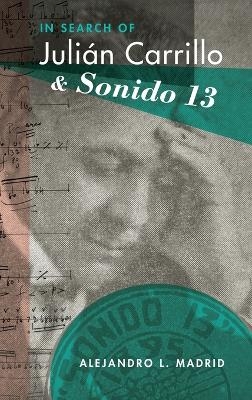
In Search of Julián Carrillo and Sonido 13
Oxford University Press Inc (Verlag)
978-0-19-021578-1 (ISBN)
In the 1920s, the Mexican composer Julián Carrillo (1875-1965) developed a microtonal system called El Sonido 13 (The 13th Sound). Although his pioneering role as one of the first proponents of microtonality within the Western art music tradition elevated Carrillo to iconic status among European avant-garde circles in the 1960s and 1970s, his music and legacy have remained largely overlooked by music scholars, critics, and performers.
Confronting this paucity of scholarship on Carrillo and his music, Alejandro L. Madrid goes above and beyond "filling in" the historical record. Combining archival and ethnographic research with musical analysis and cultural theory, Madrid argues that Carrillo and Sonido 13 are best understood as a cultural complex: a network of moments, spaces, and articulations in which Carrillo and his music continuously re-acquire significance and meaning. Thus, Madrid explores Carrillo's music and ideas not only in relation to the historical moments of their inception, but also in relation to the various cultural projects that kept them alive and re-signified them through the beginning of the twenty-first century. Eschewing traditionally linear historical frameworks, In Search of Julián Carrillo and Sonido 13 employs an innovative transhistorical narrative in which past, present, and future are explored dialogically in order to understand the politics of performance and self-representation behind Carrillo and Sonido 13.
In Search of Julián Carrillo and Sonido 13 transforms the traditional genre of the composer study, treating it not as a celebration of "masters" and "masterworks," but as a pointed postcolonial intervention that offers invaluable insight into the politics of cultural exchange, experimentalism, marginality, and cultural capital in twentieth century Mexico.
Alejandro L. Madrid is a music scholar and cultural theorist whose research focuses on the intersection of modernity, tradition, and globalization in music and expressive culture from Mexico, the U.S.-Mexico border, and the circum-Caribbean. His books have received the AMS's Robert M. Stevenson and Ruth A. Solie awards, the Béla Bartók award from the ASCAP Deems Taylor Awards, IASPM's Woody Guthrie Book Award, and the Casa de las Américas Musicology Prize. He is associate professor of musicology at Cornell University.
About the Companion Website ; List of Figures ; List of Music Examples ; Acknowledgements ; Chapter 1. Introduction: A Cultural Complex's ; Non-Linear Story ; Chapter 2. Imitation, Ideology, Performativity, and ; Carrillo's Symphony No. 1 ; Chapter 3. '...y hermosisima patria sera': National and ; Post-National Transfigurations in Matilde ; Chapter 4. Modernism, Teleology, and Identity: Toward ; a Cultural Understanding of Early Sonido 13 ; Chapter 5. Reading Carrillo: The Future that Never Was ; Chapter 6. Continuities and Discontinuities in an Imaginary ; Cycle: The Thirteen String Quartets ; Chapter 7. Experimentalism, Mythology, the Intermundane, ; and Sonido 13 after Julian Carrillo ; Chapter 8. Estrangement, Performance, and Performativity: ; Musicking Sonido 13 ; Bibliography
| Erscheint lt. Verlag | 12.11.2015 |
|---|---|
| Reihe/Serie | Currents in Latin American and Iberian Music |
| Verlagsort | New York |
| Sprache | englisch |
| Maße | 236 x 155 mm |
| Gewicht | 599 g |
| Themenwelt | Kunst / Musik / Theater ► Musik ► Musiktheorie / Musiklehre |
| Geschichte ► Teilgebiete der Geschichte ► Kulturgeschichte | |
| Sozialwissenschaften | |
| ISBN-10 | 0-19-021578-X / 019021578X |
| ISBN-13 | 978-0-19-021578-1 / 9780190215781 |
| Zustand | Neuware |
| Haben Sie eine Frage zum Produkt? |
aus dem Bereich


